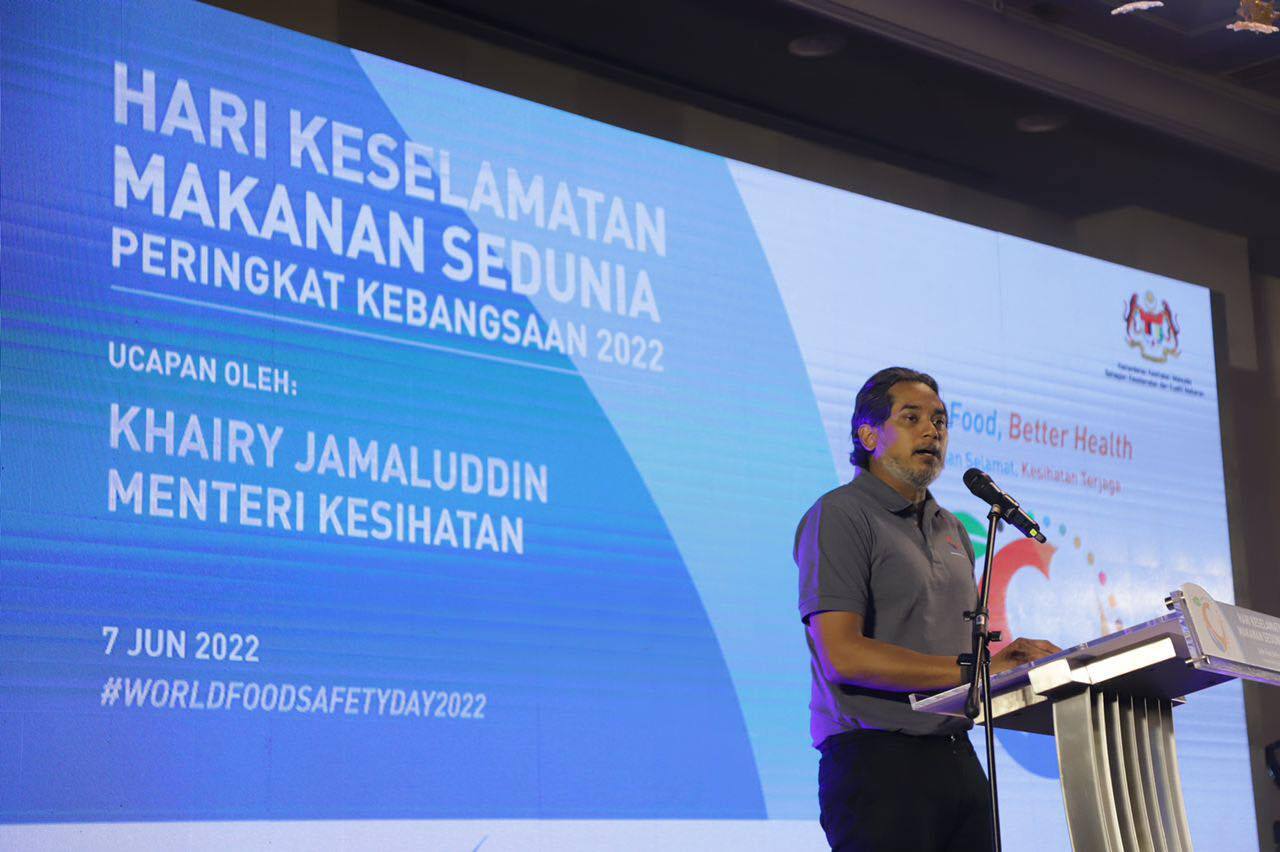SEPANG, June 7 – The Ministry of Health (MOH) is considering plans to upgrade its Food Safety and Quality Division (BKKM) into a food safety authority – akin to the United States’ Food and Drug Administration (FDA) and the United Kingdom’s Food Safety Agency (FSA).
Health Minister Khairy Jamaluddin said the medium-term plan takes into account emerging technologies and innovations in the food industry that may have some potential negative trade-offs in areas of food safety and public health.
Among developing nations, microbial contaminations (26 per cent), chemical contaminations (16 per cent), food adulteration (16 per cent), misuse of additives (16 per cent), and mislabeling (16 per cent) are the commonest food safety issues in the food market, according to a study published in the Environmental Health and Preventive Medicine journal.
Unsafe food containing harmful bacteria, viruses, parasites, or chemical substances causes more than 200 diseases – ranging from diarrhoea to cancers. The World Health Organization (WHO) estimates every one in 10 people in the world, or approximately 600 million people in total, fall ill after eating contaminated food, with 420,000 deaths occurring every year, resulting in the loss of 33 million disability-adjusted life years (DALYs).
DALYs are the sum of the years of life lost due to premature mortality and the years of healthy life lost due to time lived in poor health or disability.
Food safety in Malaysia is governed by the Food Act 1983 that was last amended in 2006. The law protects the public against health hazards and fraud in the preparation, sale and use of food.
“From time-to-time, we will make amendments (to the law). There are a few amendments that the Ministry of Health (MOH) and myself are looking into, including BKKM’s status – whether it will continue to be a division under MOH or upgraded into a food safety authority.
“There are countries where food safety is placed under the jurisdiction of a food safety authority, including future issues on food security,” Khairy told reporters after officiating the World Food Safety Day 2022 celebration here today.
“I would say it’s a medium-term plan because at the moment, from a food safety point of view, the programme we have is sufficient. However, going forward, with the many new technologies that will be made available and the need to streamline our duties with other ministries like the Ministry of Agriculture and Food Industries, we may have to review our structure and the laws that we currently have in place,” Khairy said.
Khairy, in his speech, addressed the need for MOH to be “ahead of the curve” in food safety, with the rise of new food technologies and innovations such as lab-based meat.
“These days, the discussion is on lab-based meat. This is an example of a new food technology developed to reduce our carbon footprint. We know that if we continue to rely on traditional meat suppliers, it will have an enormous impact on our environment.
“The carbon footprint of these traditional farms is too high and this will prevent us from achieving our targets of making the world more sustainable,” Khairy said.
The increasing usage of online food delivery platforms have also changed the way people demand for and consume food, Khairy added.
“In this regard, non-governmental organisations (NGOs) and the p-hailing (food delivery) service industry have the responsibility to ensure that the food produced and sold are clean and safe,” the health minister said.
Also present during the event were MOH’s deputy director-general (public health) Dr Chong Chee Keong, BKKM director (compliance and industry development) Norrani Eksan, and representatives from FoodPanda, Grab Malaysia, Shopee Malaysia, and the Malaysian Food Safety Association (MAFSA).
In Malaysia, food poisoning incidents remain under control, Khairy said. MOH data showed a 31.6 per cent decline in food poisoning trend to 197 cases in 2021 from 5,288 cases in 2020, amid the Covid-19 pandemic that saw people largely stay at home as dine-ins at eateries were prohibited during lockdowns.








